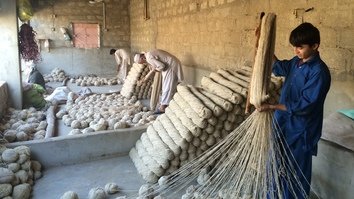PESHAWAR -- Pakistan, with the support of UN High Commission for Refugee (UNHCR), has launched an emergency relief package for Afghan refugees in the country who have been affected by COVID-19 and the economic fallout from the associated lockdown.
The cash-support programme will be provided to the refugee families in collaboration with the Ministry of States and Frontier Regions (SAFRON).
The effort will help 36,000 families and will be further extended to more Afghans once additional funds are available.
"The UNHCR is to give Rs. 12,000 ($74) in emergency cash to the most vulnerable refugee families in Pakistan," said Qaiser Khan Afridi, a spokesman for the UNHCR.
![Needy Afghan refugees in Pakistan receive cash support from the UNHCR May 21. [Commissionerate for Afghan Refugees, KP]](/cnmi_pf/images/2020/06/02/24282-refugees1-585_329.jpg)
Needy Afghan refugees in Pakistan receive cash support from the UNHCR May 21. [Commissionerate for Afghan Refugees, KP]
![An Afghan refugee in Mohmand District carries his children in a donkey cart in April. [Alamgir Khan]](/cnmi_pf/images/2020/06/02/24286-donkey-585_329.jpg)
An Afghan refugee in Mohmand District carries his children in a donkey cart in April. [Alamgir Khan]
The initiative has already begun for many Afghan refugee families, Afridi said.
The initiative for Afghan refugees is similar to the Ehsaas Emergency Cash programme launched by the Pakistani government, which also provides Rs. 12,000 to vulnerable families.
The emergency assistance will help eligible refugee families meet their urgent needs during the COVID-19 outbreak, according to the UNHCR.
The UNHCR deputy representative in Pakistan, Iain Hall, and Muhammad Akhlaque Rana, the director general of the Pakistan Post Office Department, signed an agreement for the disbursement of the aid on May 13.
The UNHCR and Commissionerate for Afghan Refugees conducted an assessment survey with assistance from partners, volunteers and refugee community leaders to identify needy families.
Those eligible for the emergency assistance include refugees with disabilities or serious medical conditions, as well as single parents.
"The UNHCR is very concerned by the growing destitution of refugee families who solely depend on daily wages. We hope that this emergency assistance will help the most vulnerable get through this health pandemic," Hall said.
The UNHCR will initially target 36,000 refugee families, said Hall, noting that if it secures additional donor funds, it will extend humanitarian support to many more vulnerable families.
The UNHCR will provide cash support to 100,000 refugee families in the second phase of the programme, said SAFRON Minister Shehryar Afridi May 9 in Islamabad.
Extreme poverty
A large number of Afghan families live in extreme poverty as they are mostly daily wagers, vendors, or operators of small businesses and have lost their sources of income during the lockdown.
Pakistan has about 1.5 million registered Afghan refugees, while almost a million others are said to be living in Pakistan without proper documents. The refugees generally live in cities, villages and suburbs instead of in camps and work in small businesses. In Iran, Afghan refugees are confined to camps.
"I used to drive an auto rickshaw, but I haven't been able to do my job since the lockdown," said Daulat Khan, an Afghan refugee in his early 30s. He added that he is the sole provider for his family, which includes his wife, his mother and two siblings.
"The local people have provided rations for our family as well as for other deserving families since the lockdown," said Khan.
"Business has been at its lowest point for the last two months, and the cash support will benefit a large number of deserving families," said Hanif Ullah, an Afghan refugee working at a restaurant as a server.
In addition to the cash support, the UNHCR has offered other support to Afghan refugees during the coronavirus crisis.
In early April, the UNHCR and the Commissionerate for Afghan Refugees handed over five fully equipped ambulances to the Khyber Pakhtunkhwa (KP) government for COVID-19-related issues.
The ambulances are deployed in Kohat, Peshawar, Swabi, Haripur and Mardan.

![An Afghan refugee in Peshawar May 10 makes a traditional sweet. [Shahbaz Butt]](/cnmi_pf/images/2020/06/02/24285-refugees-585_329.jpg)







Afghan migrants are very close to Pakistan. Two of their generations have brought up in Pakistan. No one takes any practical step for them except UNHCR and the Government of Pakistan. But their condition is better than the Pakistanis residing in camps in Bangladesh!!
Reply1 Comment(s)